When is the last stop for the Edinburgh tram inquiry?
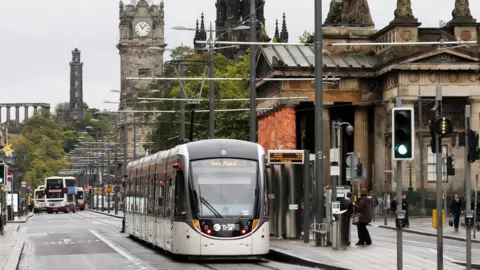 PA
PAThe building of Edinburgh's tram line was a saga of delays and cost overruns so it is ironic that the public inquiry into the the bungled construction has also been long and expensive.
The statutory hearing, announced exactly six years ago, has now taken as many years as it took to build the troubled 8.7 mile (14km) line stretching from Edinburgh airport to the city centre.
It is just over two years since the probe's last public hearing and the price tag so far is £11m. Despite this the inquiry insists "it will take as long as is necessary to get the answers required".
But for some it is not clear what there is left to learn about the handling of the £1bn Edinburgh tram project.
From the "folly" of the unfinished National Monument on top of Calton Hill to the over-budget Scottish Parliament building, Edinburgh is no stranger to a controversial building scheme.
The re-birth of trams in the Scottish capital was no exception.
During its lifetime, the project's price tag doubled, the actual network being built was halved and it took twice as long to construct as was first promised.
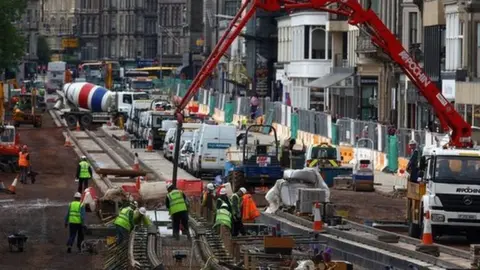 Jeff J Mitchell
Jeff J MitchellSo it was far from surprising when Alex Salmond, who had narrowly failed in an earlier bid to axe the scheme, announced the public inquiry on 5 June 2014.
The then-first minister promised a "swift and thorough inquiry" which would explain why things went so wrong and what could be done to avoid a repeat in future projects.
'Hell on wheels'
Lord Hardie, one of Scotland's most experienced legal minds, was put in charge a week later.
The complexity of a project branded "hell on wheels" by former chairman David Mackay when he quit in 2010 would have been immediately apparent to the retired judge.
This has been to a large extent mirrored in the public inquiry which has sifted through more than six million documents and dealt with scores of witnesses.
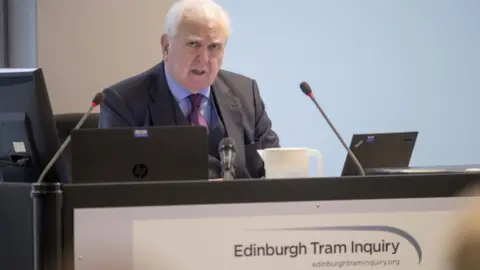 PA
PAThe inquiry has also had its own setbacks.
A break-in at its offices in 2015 was then followed by the first public hearing being postponed when Lord Hardie was taken ill.
The cost of the inquiry has increased to just under £11m, including £200,000 set aside for costs in the current financial year.
This is in the same ballpark as the likes of Penrose, which examined how thousands of patients in Scotland were infected with hepatitis C and HIV, and only £2m short of what was spent on the Chilcott Iraq War inquiry.
'Extremely poor deal'
The tram inquiry's team were forensic in their approach to witnesses appearing at the public hearings but the subject matter meant proceedings would often disappear down acronym-lined rabbit holes.
The often empty public seats and lack of wall-to-wall media coverage of proceedings were testament to this.
But there were some damning moments.
Douglas Fairley, a lawyer representing directors of the tram delivery company Tie, said the contract was an "extremely poor deal for the council" which should never have been made.
And there were also claims former tram boss Willie Gallagher was openly admitting the price would rise as soon as the contract was signed.
'You wonder what there is left to learn'
The inquiry is formally at its final stage where the evidence is being reviewed.
But one inquiry witness, who asked not to be named, questioned how much of an appetite for the findings there was now.
They said: "Since it started this has all had the feeling of 'after the Lord Mayor's show' about it.
"All of the mistakes were both very painful and very public; you wonder what there is left to learn from this we don't already know, especially after six years."
Indeed, the current City of Edinburgh Council administration has opted to press ahead with an extension to the tram line without waiting for the outcome of the inquiry,
Council leader Adam McVey has pledged to "make sure the things that happened in the last project are not repeated".
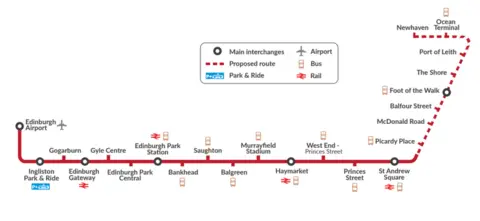 City of Edinburgh Council
City of Edinburgh CouncilOne of the areas which will be most keenly watched in the findings is how much Lord Hardie reflects on the political dimension of the saga.
The opposition of the SNP, both at Holyrood and as Lib Dem coalition partners at Edinburgh City Council, was made crystal clear in the critical period of 2007/08 for the project.
The role of Transport Scotland in monitoring the project, the original legal advice given ahead of signing the main contract and the chain of command in the council will also be areas closely watched.
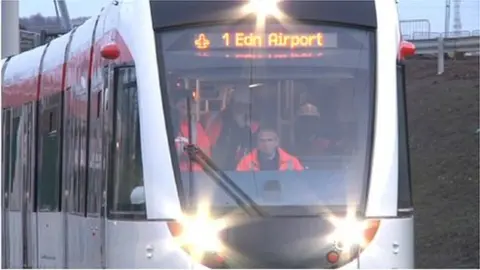 bbc
bbcA 2011 review by Audit Scotland ruled the tram project had been undermined by poor planning, cost underestimates, contract disputes and a lack of clear leadership by the council.
Nearly a decade on, it is hard to see how the public inquiry will deviate from this view.
'It will take as long as is necessary'
A spokeswoman for the Edinburgh Tram Inquiry said: "The findings of the inquiry into why the Edinburgh Trams project incurred delays, cost more than originally budgeted and delivered significantly less than planned will be made available at the earliest opportunity.
"Lord Hardie's remit is to conduct a robust inquiry and it will take as long as is necessary to get the answers required to fulfil the terms of reference.
"We continue to make good progress, including managing more than three million documents on the inquiry's evidence database for handover to National Records of Scotland.
"A relevant set is also being prepared to be made available on the inquiry's website to accompany the published report at the appropriate time."
